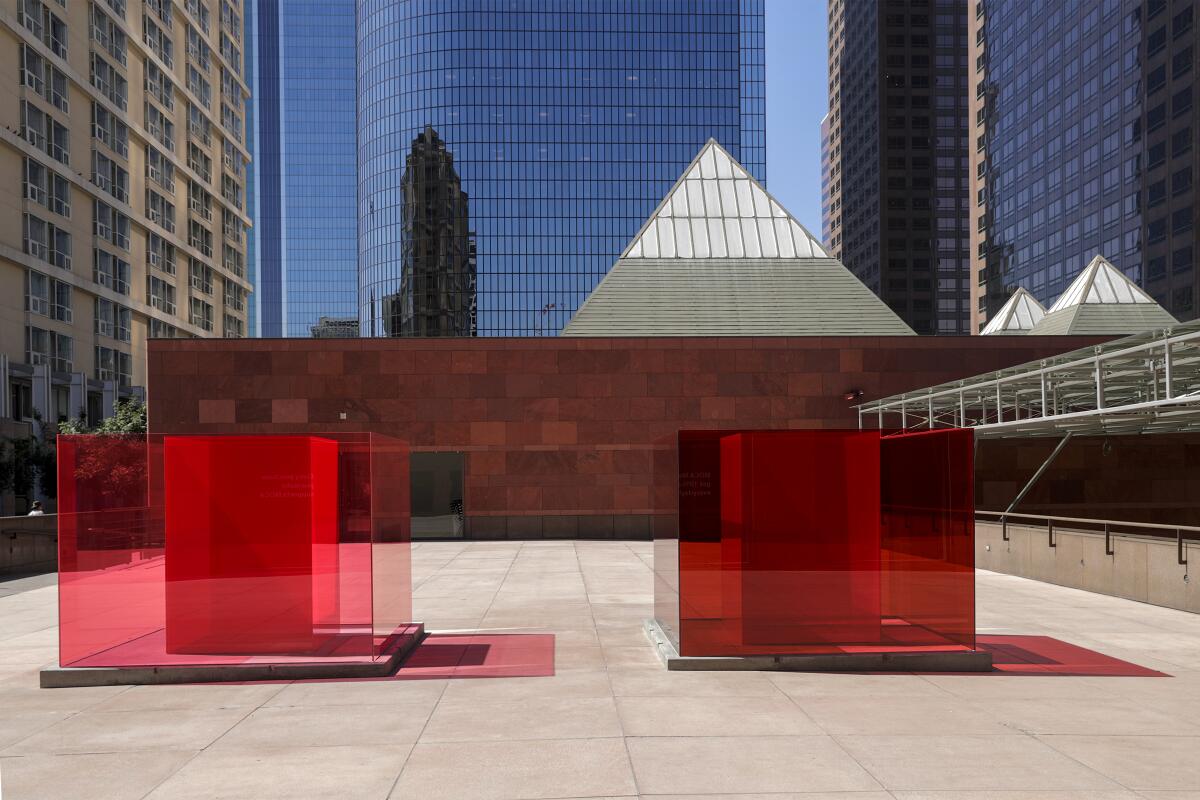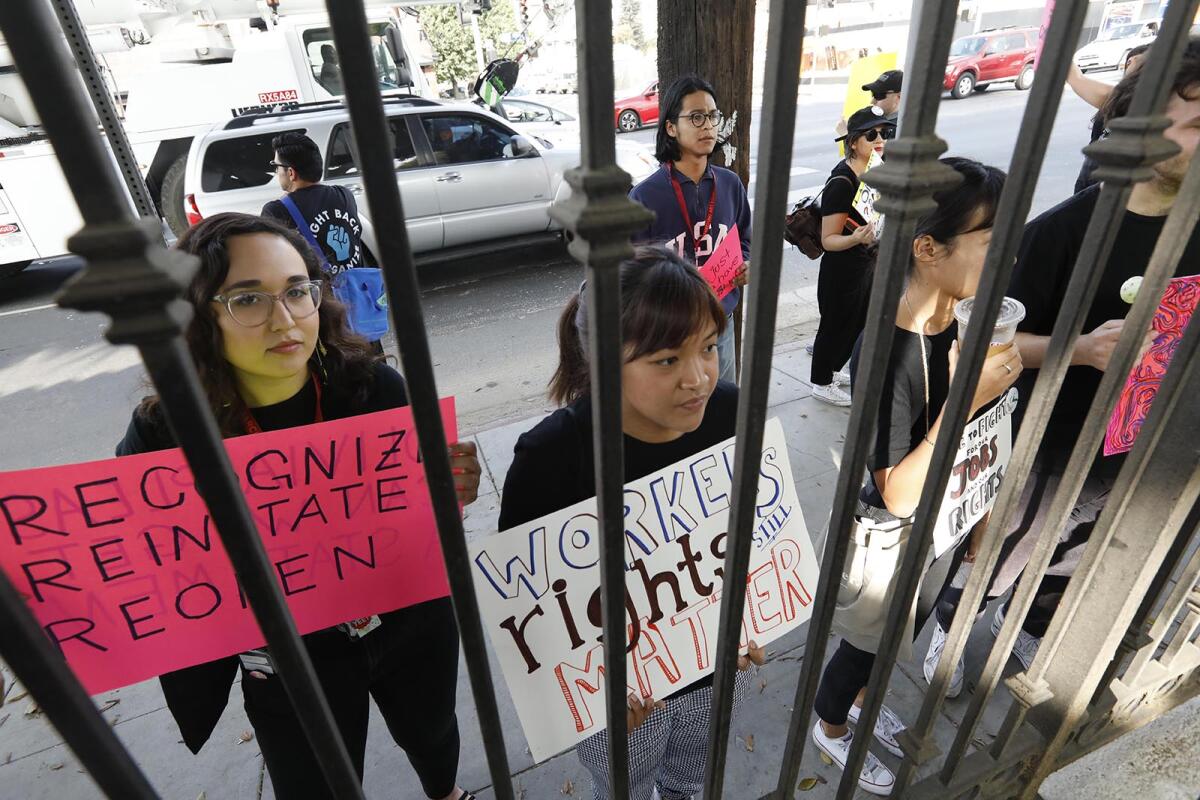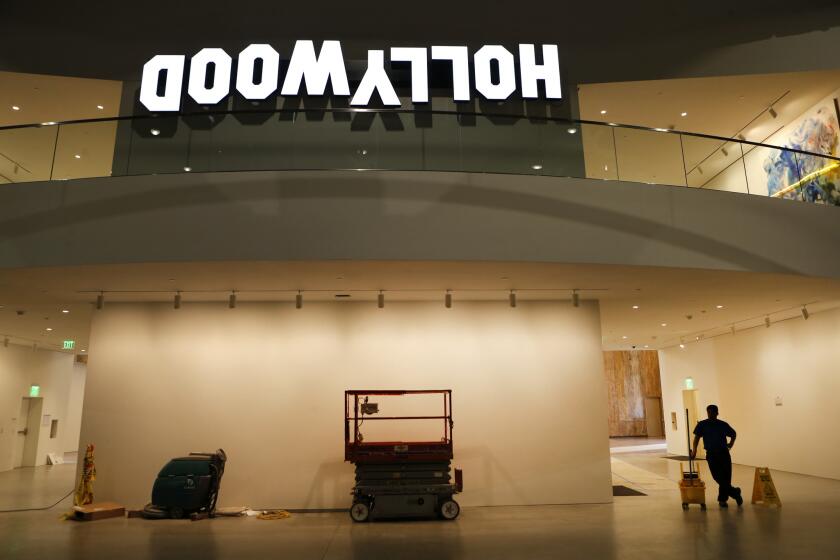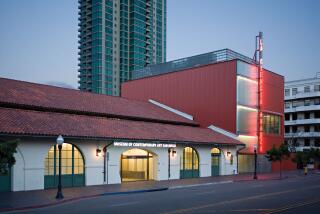MOCA will voluntarily recognize new employee union; Marciano closure is permanent

The Museum of Contemporary Art in Los Angeles said Friday that it would voluntarily recognize a new union formed by more than 100 visitor services employees.
The employees, who petitioned the National Labor Relations Board late last month, intend to unionize with the American Federation of State, County and Municipal Employees.
For the record:
11:56 a.m. Dec. 8, 2019This story states that MOCA’s union was formed by more than 100 visitor services employees. The effort, however, included numerous other classifications of workers, including graphic designers, digital producers, sales associates, educators and exhibition technicians.
“We have been outspoken for over a year about our vision for the museum as a civic-minded public institution that supports the community,” MOCA Director Klaus Biesenbach told The Times. “That is as important internally for our staff as it is externally.”
He said recognizing employees’ desire to organize is “in full alignment with this vision we have set forth for our institution. Ultimately, we’re taking this step to come together as one team, one MOCA.”
More than 120 workers at the Museum of Contemporary Art will try to unionize with the American Federation of State, County and Municipal Employees.
The burgeoning MOCA union can now be formally established without the additional step of a secret ballot election, as outlined by the NLRB.
“This is a smart move,” says Lylwyn Esangga, organizing director at AFSCME’s District Council 36. “At the end of the day the workers want a voice and a seat at the table…. It shows a willingness to recognize that seat at the table. This is unique in that many employers will go through an election or do an anti-union campaign.”
Gallery attendant and MOCA union organizer Christine Samples said in a statement: “We are thrilled MOCA will voluntarily recognize our union, and we look forward to working together to start a new partnership to serve our community. We care about MOCA and want to make it better.”
AFSCME represents workers at more than a dozen museums around the country, including the Metropolitan Museum of Art in New York and the Museum of Tolerance in Los Angeles. Early last month, visitor services workers at the Marciano Art Foundation announced their intent to unionize, but just days later the museum announced that it was laying off nearly six dozen employees and that the museum was closing down indefinitely.
On Friday afternoon, the Marciano announced that the closure was permanent.
“The foundation’s only goal was to give back to greater Los Angeles by fostering an appreciation of the arts accessible to everyone and free to the public,” read a Marciano statement. “We are grateful to the public and the art community for their enthusiastic support of this ambitious project and all that we have accomplished during the past two and a half years…. Maurice and Paul Marciano will continue to support and encourage artists and curators internationally in their creative endeavors.”
Spencer Longo, who worked in visitor services at the Marciano and was an organizing committee member of the Marciano Art Foundation union, said he and his colleagues were disappointed by the decision.
“We hope that they do reconsider because we believe that the reopening of the Marciano Art Foundation is not only what we want, it’s what the community wants, it’s what Los Angeles wants,” he said. “That would be the right thing to do.”

The union will proceed with an unfair-labor-practice filing against the Marciano Art Foundation. In paperwork that AFSCME filed with the NLRB last month, employees allege that the layoffs and closure were an attempt to bust the union.
The employer, the complaint said, “has illegally discriminated against its employees by laying off employees en masse and/or closing its facility because employees … engaged in union and other concerted activities.”
A representative for the Marcianos did not return a request for comment.
It’s unclear whether the foundation will try to evolve into another type of art institution, such as a lending organization. Also unknown is the fate of the building, a 1961 Scottish Rite Masonic Temple designed by Millard Sheets.
Less than a week after Marciano Art Foundation employees begin a unionization, the 2-year old museum is closing its doors.
The last year has seen a wave of unionization campaigns by visitor services employees at the New Museum of Contemporary Art and the Guggenheim Museum in New York, as well as the New Children’s Museum in San Diego and the Frye Museum in Seattle.
Visitor services associates, who help monitor galleries, often work part-time and without benefits. Wages for many hover around the minimum. In recent years the work has evolved, requiring gallery attendants to not only protect the art but also to have knowledge of art and art history.
“We are paid minimum wage, but what is expected of us is more than a typical minimum wage,” Betsy-Ann Toffler, a part-time visitor services associate, told The Times last month.
It is a model that was pioneered by the Broad museum when it opened in 2015 and has been picked up by many other museums, including MOCA (where Maurice Marciano is a chair emeritus of the board of trustees).
At MOCA, the process will move forward, with employees and management meeting next week to have an independent auditor verify the cards that were submitted to the NLRB expressing employees’ desire to unionize. Then they can move into negotiations.
“We look forward to moving forward in good faith to establish an equitable and sustainable contract,” Biesenbach said.
More to Read
The biggest entertainment stories
Get our big stories about Hollywood, film, television, music, arts, culture and more right in your inbox as soon as they publish.
You may occasionally receive promotional content from the Los Angeles Times.









